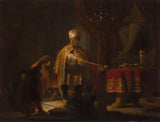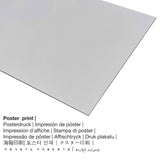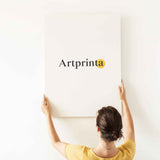Rembrandt van Rijn, 1633 - Daniel and Cyrus Before the Idol Bel - fine art print
Tax included. Shipping calculated at checkout.
Artwork information by the museum (© - by The J. Paul Getty Museum - The J. Paul Getty Museum)
When King Cyrus of Persia, seen at the center, asked his confidant Daniel why he does not worship the deity Bel, whose lower half can be seen in the shadows, Daniel replied that he worshipped a living god, not an idol. The king insisted that Bel was a living god and pointed to the offerings of food and wine that Bel consumed every night. Cautiously, Daniel noted that bronze statues do not eat. Cyrus was momentarily bewildered, but the worried faces of the priests in the background confirm that Daniel has exposed their deception. This story of Daniel's dramatic exposure of the king's idol-worship derives from the apocryphal portion of the Book of Daniel. Light illuminates the figures of Cyrus and Daniel, highlighting their dramatic encounter. Rembrandt contrasted the king's grandeur with Daniel's humility. Facing out and gesturing toward the table, the lavishly attired Cyrus appears large and imposing. By contrast, the youthful Daniel seems small, and his posture suggests modesty or submissiveness before his ruler. Rembrandt evoked the exotic mystery of a pagan cult by showing only part of the monumental idol emerging from the flickering lamplight on the right. Inside the shadowy temple, light catches and reflects off the extravagant finery worn by Cyrus and the gold vessels placed atop the velvet tablecloth.
Interesting facts about the artwork named "Daniel and Cyrus Before the Idol Bel"
In the year 1633 the male Dutch artist Rembrandt van Rijn made this piece of art "Daniel and Cyrus Before the Idol Bel". The painting was painted with the dimensions of 23,5 × 30,2 cm (9 1/4 × 11 7/8 in). Oil on panel was used by the artist as the medium of the masterpiece. This artpiece can be viewed in in the digital collection of The J. Paul Getty Museum located in Los Angeles, California, United States of America. With courtesy of: The J. Paul Getty Museum (public domain license).Creditline of the artwork: . The alignment of the digital reproduction is landscape with a side ratio of 4 : 3, which means that the length is 33% longer than the width. The painter Rembrandt van Rijn was an artist from the Netherlands, whose style was mainly Baroque. The Baroque painter was born in the year 1606 in Leiden and passed away at the age of 63 in the year 1669.
Choose your favorite product material
We offer a range of different materials and sizes for every product. Therefore, we allow you to choose among the following options:
- Printed acrylic glass (with real glass coating): An print on acrylic glass, often referenced as a plexiglass print, will transform the original work of art into beautiful wall décor.
- Canvas: A canvas print, which should not be mistaken with a canvas painting, is a digital replica printed onto cotton canvas fabric. Furthermore, a printed canvas generates a charming and enjoyable atmosphere. How do I hang a canvas on my wall? A canvas print has the advantage of being low in weight. This means, it is easy to hang the Canvas print without the support of extra wall-mounts. Canvas prints are suited for all kinds of walls.
- Poster (canvas material): Our poster print is a printed sheet of cotton canvas paper with a nice structure on the surface. Please note, that depending on the size of the canvas poster print we add a white margin of approximately 2-6cm around the artwork, which facilitates the framing.
- Aluminium dibond print: Aluminium Dibond prints are metal prints with an outstanding effect of depth. The Direct Print on Aluminum Dibond is the best start to the sophisticated world of fine art prints manufactured with aluminum. The bright sections of the original work of art shine with a silky gloss but without the glow. The direct print on aluminium is one of the most demanded entry-level products and is an extremely contemporary way to display art prints, since it draws attention on the artwork.
Artist details table
| Name of the artist: | Rembrandt van Rijn |
| Gender of the artist: | male |
| Nationality: | Dutch |
| Professions: | painter |
| Country of origin: | the Netherlands |
| Artist category: | old master |
| Styles of the artist: | Baroque |
| Life span: | 63 years |
| Birth year: | 1606 |
| Birthplace: | Leiden |
| Died in the year: | 1669 |
| Place of death: | Amsterdam |
Artpiece details
| Piece of art title: | "Daniel and Cyrus Before the Idol Bel" |
| Artwork categorization: | painting |
| Generic term: | classic art |
| Artwork century: | 17th century |
| Created in the year: | 1633 |
| Artwork age: | 380 years |
| Original medium of artwork: | oil on panel |
| Artwork original dimensions: | 23,5 × 30,2 cm (9 1/4 × 11 7/8 in) |
| Exhibited in: | The J. Paul Getty Museum |
| Place of museum: | Los Angeles, California, United States of America |
| Website of the museum: | The J. Paul Getty Museum |
| Artwork license type: | public domain |
| Courtesy of: | The J. Paul Getty Museum |
Structured product details
| Print categorization: | wall art |
| Reproduction: | digital reproduction |
| Manufacturing process: | UV direct printing |
| Origin of the product: | made in Germany |
| Type of stock: | on demand |
| Intended usage: | wall decoration, art collection (reproductions) |
| Alignment of the image: | landscape format |
| Side ratio: | length : width - 4 : 3 |
| Interpretation of image aspect ratio: | the length is 33% longer than the width |
| Available product fabrics: | acrylic glass print (with real glass coating), canvas print, metal print (aluminium dibond), poster print (canvas paper) |
| Canvas on stretcher frame (canvas print) options: | 40x30cm - 16x12", 80x60cm - 31x24", 120x90cm - 47x35", 160x120cm - 63x47" |
| Acrylic glass print (with real glass coating) sizes: | 40x30cm - 16x12", 80x60cm - 31x24", 120x90cm - 47x35", 160x120cm - 63x47" |
| Poster print (canvas paper) size variants: | 40x30cm - 16x12", 80x60cm - 31x24", 120x90cm - 47x35" |
| Aluminium print: | 40x30cm - 16x12", 80x60cm - 31x24", 120x90cm - 47x35" |
| Picture frame: | not included |
Important information: We try in order to describe the products in as much detail as possible and to exhibit them visually. Still, the tone of the printing material, as well as the print result may diverge marginally from the representation on the device's screen. Depending on your screen settings and the nature of the surface, not all colors are printed as realisitcally as the digital version. Because all art reproductions are processed and printed by hand, there might also be minor deviations in the motif's exact position and the size.
© Copyright - Artprinta (www.artprinta.com)














